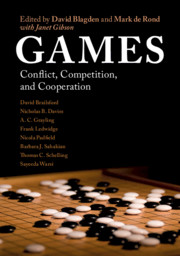Book contents
- Games
- The Darwin College Lectures
- Games
- Copyright page
- Dedication
- Contents
- Figures
- Notes on Contributors
- Acknowledgements
- Introduction Games: The Spectrum of Conflict, Competition, and Cooperation
- 1 Personal Principles in the Political Game
- 2 The Game of Crime and Punishment
- 3 Wittgenstein's Games
- 4 Games in Sports
- 5 Losing the ‘New Great Game’
- 6 Games for the Brain
- 7 Games Animals Play
- Afterword The Game Theory of Conflict
- Index
5 - Losing the ‘New Great Game’
Published online by Cambridge University Press: 26 October 2018
- Games
- The Darwin College Lectures
- Games
- Copyright page
- Dedication
- Contents
- Figures
- Notes on Contributors
- Acknowledgements
- Introduction Games: The Spectrum of Conflict, Competition, and Cooperation
- 1 Personal Principles in the Political Game
- 2 The Game of Crime and Punishment
- 3 Wittgenstein's Games
- 4 Games in Sports
- 5 Losing the ‘New Great Game’
- 6 Games for the Brain
- 7 Games Animals Play
- Afterword The Game Theory of Conflict
- Index
Summary
The failed British military campaigns in Basra and Helmand followed similar courses. They began confidently, followed by defeat in the field and US military bail-out. The enemies of UK forces now dominate both theatres. British generals prided themselves on their prowess in exactly the kind of conflicts they thought they had entered – ‘counterinsurgency’. How, then, did they go so wrong? Before an army becomes involved in conflict, it should fully understand the kind of war it is going to be, what it wants to achieve by it, and how the war will achieve those ends. British generals failed to ensure clarity on any of these questions and had no workable strategy. Furthermore, they lacked a corporate culture and flexibility to understand and adapt to the environments in which they found themselves and defaulted to methods for which they were trained. The lack of a sound intelligence system and consequent situational naïveté allowed their enemies to gain and retain the initiative. However, whilst there is a long way to go, there are signs that UK military leadership is developing the necessary skills and awareness to conduct successful operations.
- Type
- Chapter
- Information
- GamesConflict, Competition, and Cooperation, pp. 80 - 100Publisher: Cambridge University PressPrint publication year: 2018
- 1
- Cited by

